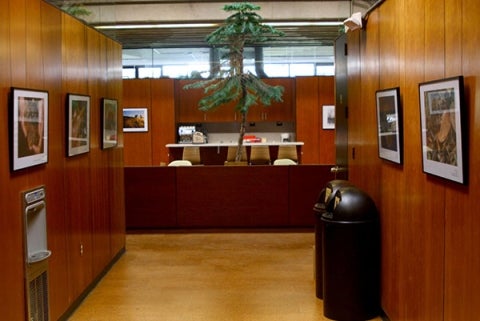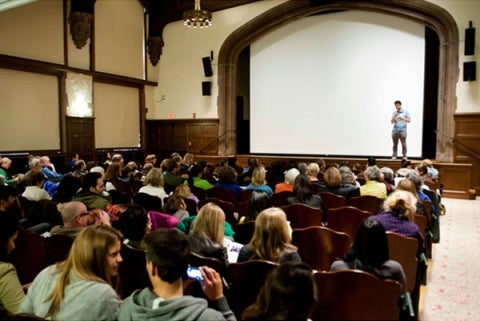Note: Yale School of the Environment (YSE) was formerly known as the Yale School of Forestry & Environmental Studies (F&ES). News articles and events posted prior to July 1, 2020 refer to the School's name at that time.
 The <a href="http://environment.yale.edu/news/article/class-of-1980-student-project-fund-awards/#timber-frame-pavilion-at-yale-myers">timber frame pavillion</a> at Yale Myers Forest, funded by the Class of 1980.
The <a href="http://environment.yale.edu/news/article/class-of-1980-student-project-fund-awards/#timber-frame-pavilion-at-yale-myers">timber frame pavillion</a> at Yale Myers Forest, funded by the Class of 1980.
In early 1980, with her graduation from F&ES approaching, Laura Snook ’80 M.F.S., ’93 D.For., made what might have seemed like an audacious challenge to her classmates.
Although most of her classmates hadn’t landed jobs yet, she suggested that they launch a fund for future student-led projects. The idea, classmates remember, was to assure that later classes would enjoy the same experiences that had made their time at Yale special.
The group raised only about $1,050 that first year. But today the Class of 1980’s student project fund is worth about $300,000. And over the course of 33 years, the fund has helped dozens of F&ES students pursue more than 50 projects, from film festivals and symposia to multimedia equipment and a pavilion at the School’s Yale-Myers Forest.
In recognition of its generous support for generations of students — including a separate scholarship fund established in 2001 — the Association of Yale Alumni has honored the F&ES Class of 1980 with its award for School Volunteer Engagement and Leadership.
‘If You Start With a Nugget...’
Thomas McHenry has helped coordinate the Class of 1980 Project Fund, including the solicitation of annual donations from his classmates. The F&ES Communications Team caught up with him to talk about the Fund.
How did the Class of 1980 Fund grow into what it is today?
When we first collected the Class of 80 Fund, we did not trust Yale to manage it correctly so, in the enthusiasm of youth, we planned to establish a 501(c)3 organization. Looking back on it now, this was very ambitious and, ultimately, unnecessary, as Yale has grown our funding much better than we could have. We put that first $1,000 collected during the spring of our last year into an interest-bearing account and for the first 7 or 8 years managed the Fund and made the gifts ourselves. Over time, the impressive number of student proposals encouraged several of our classmates to make larger gifts and the enthusiasm of the students for Class of 80 grants continued to grow. Eventually, we had enough to give the money to the university in the late '80s, which of course was the smart thing to do. We were lucky to catch the dot-com boom and the long-term immensely successful management of the Yale Endowment. I believe our Class of 80 Project Fund now exceeds $300,000 in total value.
What types of projects usually receive funding?
Typically, we have made awards to student proposals that are creative, innovative and benefit the community. The ones related to solely to scientific research or field trips that a professor organized, we weren’t as excited about. We have been most excited about the ones where the students had come up with their own idea, their own movie, their own conference, or something they wanted to do with the New Haven school district.
How have these funds benefited the school?
Just the raw ability to access money has been a huge draw for the students. Our early awards were for as little as $75 or $100. These funds have encouraged them to think creatively about projects that they might not have thought about before. Some projects proposals that we have not funded have been funded by other sources. We liked to think that the Class of 80 Project Fund has encouraged students to think about important issues they can do something about, and then take that positive approach into their careers. And we have enjoyed the connection we’ve had with the students. Over the years, the projects have been a window into their concerns and priorities... It has our class tied to the school in ways that I would never have imagined. We subsequently endowed a scholarship fund in our class’s name on the school’s 100th anniversary in 2001. That scholarship fund would not have been possible without the level of engagement that our Class of 80 Project Fund had provided us.
What advice would you give go other classes that might want to duplicate this success?
It’s a lot of work. Start with a small group of people who are committed to the idea and who will promote it. What did Margaret Mead say? It’s 10 percent of the people in the world who make everything happen. Then you just need to go to the class members and be encouraging. If you have a couple of “angels” in the class who will put up matching funding, that’s great. As the Schools will continue to need scholarship funding, I would challenge any class from the Forestry School on their 10th reunion or 20th reunion to try to establish a class scholarship fund. It’s not that hard to raise $100,000. Once you start with a nugget of money, Yale will make it grow. And then your classmates will make it grow over the years. I expect we’re going to see a couple of classes step up in the next few years.
“We thought our experience at the school was something that everybody ought to have,” said Jane Sokolow ’80 M.F.S., who is now an independent consultant and sits on the F&ES Alumni Board. “We thought that every student should not only have an opportunity to take advantage of all that Yale had to offer but to also give something back in return.
“One way we thought we could give back was this fund.”
The project fund has grown significantly over the years as alumni have been able to contribute more — and a couple of “angels” have stepped up quietly to make major contributions, said Thomas McHenry ’77 B.A. ’80 M.F.S., now a partner at Gibson, Dunn & Crutcher in Los Angeles, who has helped coordinate the fund, and solicit annual donations to the fund from his classmates.
Likewise, the scholarship fund, which helps support two or three students per year, has grown to more than $300,000. (The scholarship recipients this year are Victoria Montanez ’13 B.A. ’14 M.E.M., and Timothy Brown ’15 M.E.Sc.)
“The reason it has been so successful is because of the leadership that different people in the class have shown over the years,” McHenry said. “And that has made it really fun for everybody. In my opinion, it’s one of the great things we’ve ever done. It has our class tied to the school in ways that I would never have imagined.”
It all started with the project fund. After controlling the money directly for several years, class members decided in the late 1980s to have Yale University manage it as an endowment. But in many ways, McHenry said, the project fund hasn’t changed much in three decades. Students still submit short proposals that are voted on by all members of the class. The alumni usually support a handful of projects each year, with a $4,000 cap for each project.
And the class members still tend to support projects that will benefit as many people as possible.
Last year, the fund supported eight student projects, including the Environmental Film Festival at Yale; an aquaculture microfarm for research; a conservation field trip to Yellowstone; a symposium for high school girls, Green Careers, Women Leaders; improvement projects for Yale-Myers Forest Camp; and a student research photo installation for the School’s newly renovated Greeley Laboratory.
"The Class of 1980, through their generous student project and scholarship funds, has had a significant, ongoing impact on the quality of our students' educational experience at F&ES,” said Tim Northrop, director of the F&ES Office of Development & Alumni Services. “Our hope is that other alumni classes and affiliated groups will be inspired to begin similar initiatives and grow them over time.”
During a recent conference, Jane Sokolow was introduced to a recent F&ES graduate by a mutual acquaintance. “He asked me, ‘What class were you in?’ I said ‘1980,’ and he said, ‘Oh, my God! You guys funded a project for me and that’s how I got this job!’”
Early on, Sokolow remembers, some members of the class were skeptical that the fund would ever work. “And then the projects started to roll in and we saw the fruits of what our money was doing,” she said. “And suddenly it was a lot easier to raise money. Because people thought, oh wait, we actually are making a difference.”
 A gallery of research photos at the Greeley Memorial Laboratory was funded by the Class of 1980.
A gallery of research photos at the Greeley Memorial Laboratory was funded by the Class of 1980.
 The Environmental Film Festival at Yale
The Environmental Film Festival at Yale
 The <a href="http://environment.yale.edu/news/article/class-of-1980-student-project-fund-awards/#timber-frame-pavilion-at-yale-myers">timber frame pavillion</a> at Yale Myers Forest, funded by the Class of 1980.
The <a href="http://environment.yale.edu/news/article/class-of-1980-student-project-fund-awards/#timber-frame-pavilion-at-yale-myers">timber frame pavillion</a> at Yale Myers Forest, funded by the Class of 1980.
 A gallery of research photos at the Greeley Memorial Laboratory was funded by the Class of 1980.
A gallery of research photos at the Greeley Memorial Laboratory was funded by the Class of 1980.
 The Environmental Film Festival at Yale
The Environmental Film Festival at Yale